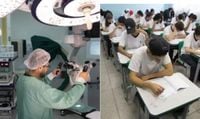On Tuesday, May 6, 2025, Brazil climbed five positions in the global ranking of the Human Development Index (HDI), according to a report released by the United Nations Development Programme (UNDP). The report, analyzing data from 2023, shows that the country moved from 89th to 84th place among 193 evaluated nations.
The HDI is an indicator created by the UN that measures the progress of countries based on three dimensions: life expectancy, access to education, and per capita income. Brazil's score increased to 0.786 on a scale that ranges from 0 to 1. In 2022, Brazil's HDI was 0.760.
The improvement is attributed mainly to an increase in gross national income per capita and a recovery in health indicators, with life expectancy returning to growth after the impacts of the COVID-19 pandemic. However, despite this advancement, the performance in education remains stagnant. The average study time of the population continues to be below the average of countries with high HDI, which contributes to Brazil's position falling short of expectations among the world's nations.
Brazil's HDI is slightly above the global average of 0.739 but still far from the very high HDI countries led by Iceland, Norway, and Switzerland. In comparison with Latin American and Caribbean nations, Brazil occupies an intermediate position. It trails behind Chile (HDI 0.855), Argentina (0.849), and Uruguay (0.809), but is ahead of countries like Paraguay (0.728), Bolivia (0.693), and Venezuela (0.691).
The report highlights internal inequalities within Brazil, with municipal HDI varying greatly between regions and revealing disparities in access to health, education, and income within the country.
Countries that topped the HDI rankings include:
- 1st: Iceland - 0.972
- 2nd: Norway - 0.970
- 3rd: Switzerland - 0.970
- 4th: Denmark - 0.962
- 5th: Germany - 0.959
- 6th: Sweden - 0.959
- 7th: Australia - 0.958
- 8th: Hong Kong (China) - 0.955
- 9th: Netherlands - 0.955
- 10th: Belgium - 0.951
On the other end of the spectrum, the countries with the lowest HDI rankings include:
- 184th: Yemen - 0.470
- 185th: Sierra Leone - 0.467
- 186th: Burkina Faso - 0.459
- 187th: Burundi - 0.439
- 188th: Mali - 0.419
- 188th: Niger - 0.419
- 190th: Chad - 0.416
- 191st: Central African Republic - 0.414
- 192nd: Somalia - 0.404
- 193rd: South Sudan - 0.388
Despite the progress, the report warns of the growing inequalities globally. The HDI recorded the smallest growth since 1990, with the gap between countries with very high HDI and those with low HDI widening for the fourth consecutive year. Achim Steiner, the UNDP administrator, expressed concern over the potential long-term impacts of this trend.
“We were on the right track for some time to reach a very high human development index globally by 2030, but this slowdown signals a threat. If the slow progress becomes 'the new normal,' that 2030 milestone could slip back decades, making the world less secure, more divided, and more vulnerable to economic and ecological shocks,” said Steiner.
The UNDP report also emphasizes the potential of artificial intelligence (AI) as a tool to explore new paths for human development. A global survey indicated that about 20% of participants already use AI technology, and while half expect their jobs to be automated due to AI, 60% believe the impact could be positive, creating new opportunities.
Steiner noted, “With the right policies and a focus on people, AI can be a crucial bridge to new knowledge, skills, and ideas that can empower everyone, from farmers to small business owners.” He stressed the importance of a human-centered approach to AI, ensuring that technology complements human skills rather than replacing them.
In summary, while Brazil's advancement in the HDI ranking is a positive development, the country still faces significant challenges, particularly in education and internal inequalities. The global context presents a worrying picture, with the UNDP calling for urgent action to address these disparities and leverage technology for a more equitable future.






